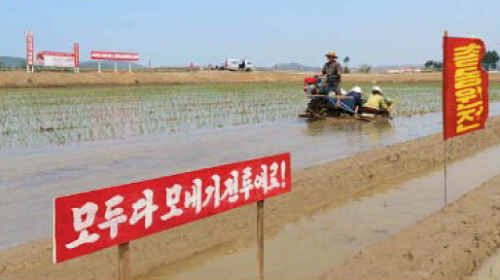The North Korean authorities have recently ordered agricultural mobilization to occur 10 days before the traditional start date across the nation. Residents are said to be in a state of confusion about the sudden change.
The “rice-planting battle” is already underway in some parts of North Korea, requiring enterprise workers and students to contribute manual labor for 40 days at collective farms, regardless of their circumstances.
“The national rice planting battle started in North and South Hwanghae Provinces and South Pyongan Province on May 10. As the Party handed down instructions to ‘concentrate all resources into farming,’ the factory workers, students, and even housewives are all being mobilized for the ‘battle of agricultural support,'” a source in South Pyongan Province told Daily NK on May 14.
“The heads of the district administrative bodies and the people’s units visit each household every morning, shouting, ‘Those who are eating must all come out for the rice planting battle.’ High school students and factory workers are required to attend collective farms for 40 days, while housewives commute to nearby farms each morning.”
The North Korean authorities designate a number of agricultural support periods throughout the farming season: rice planting and weeding in May and June, and harvesting periods in September and October, mobilizing even the youngest students as well as adults for work. However, rice sowing has begun 10 days earlier than usual, allegedly due to higher average temperatures attributable global warming.
Although agricultural experts have noted that sowing too early can actually lower the overall quality of cultivated rice, residents have no choice but to follow orders.
“Because the orders were unexpected, competition for food supplies is rising between the factory workers and parents. Demand for rice and other foodstuffs needed during the agricultural support period is increasing, and the price of rice at Pyongsong Market has leapt by 200 KPW overnight,” a separate source in South Pyongan Province reported.
“In May, there are usually chronic food shortages at the collective farms and in the cities alike. With food hoarding compounding the problem, some residents are having a really hard time. People are criticizing the authorities for mobilizing people without food provisions.”





















